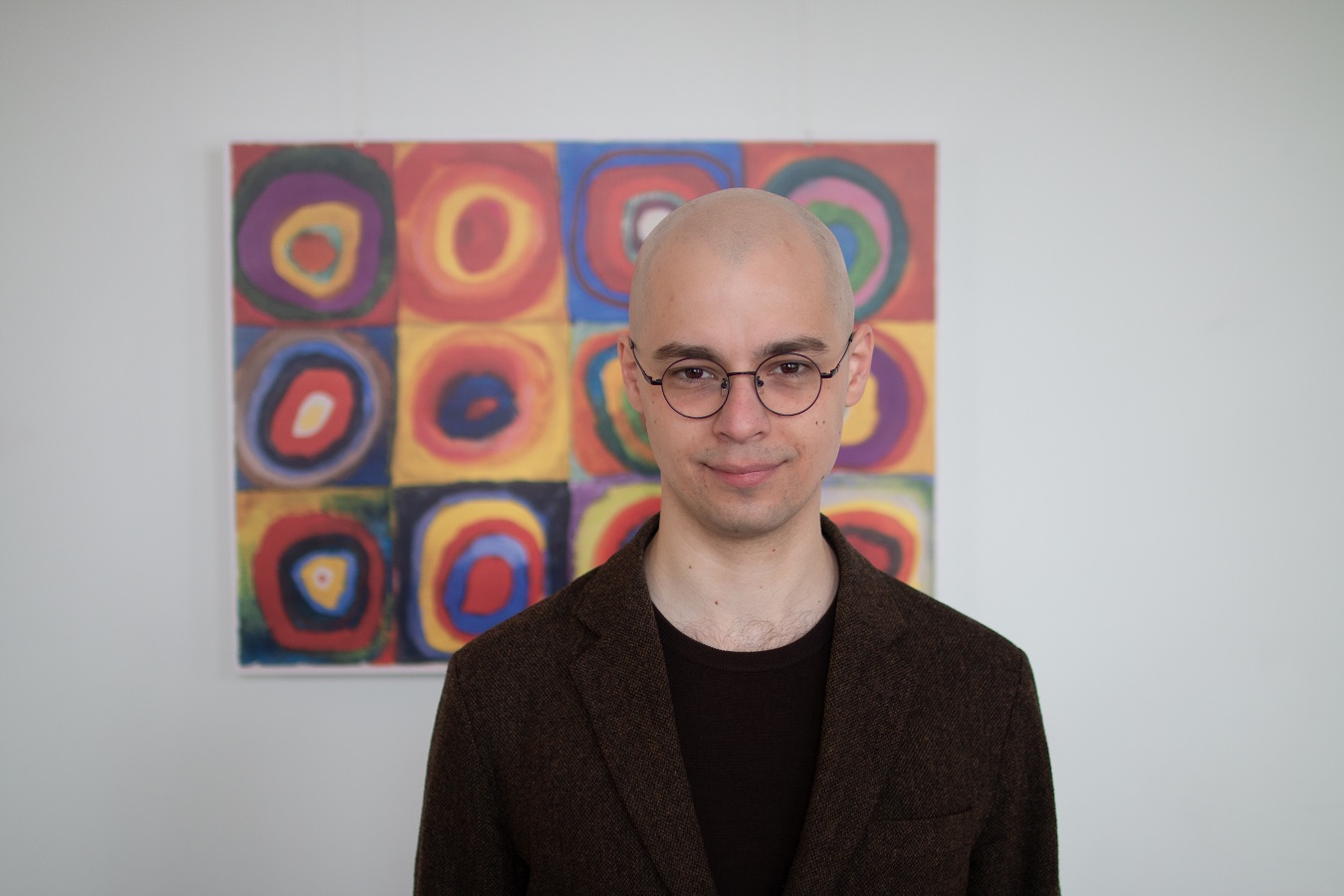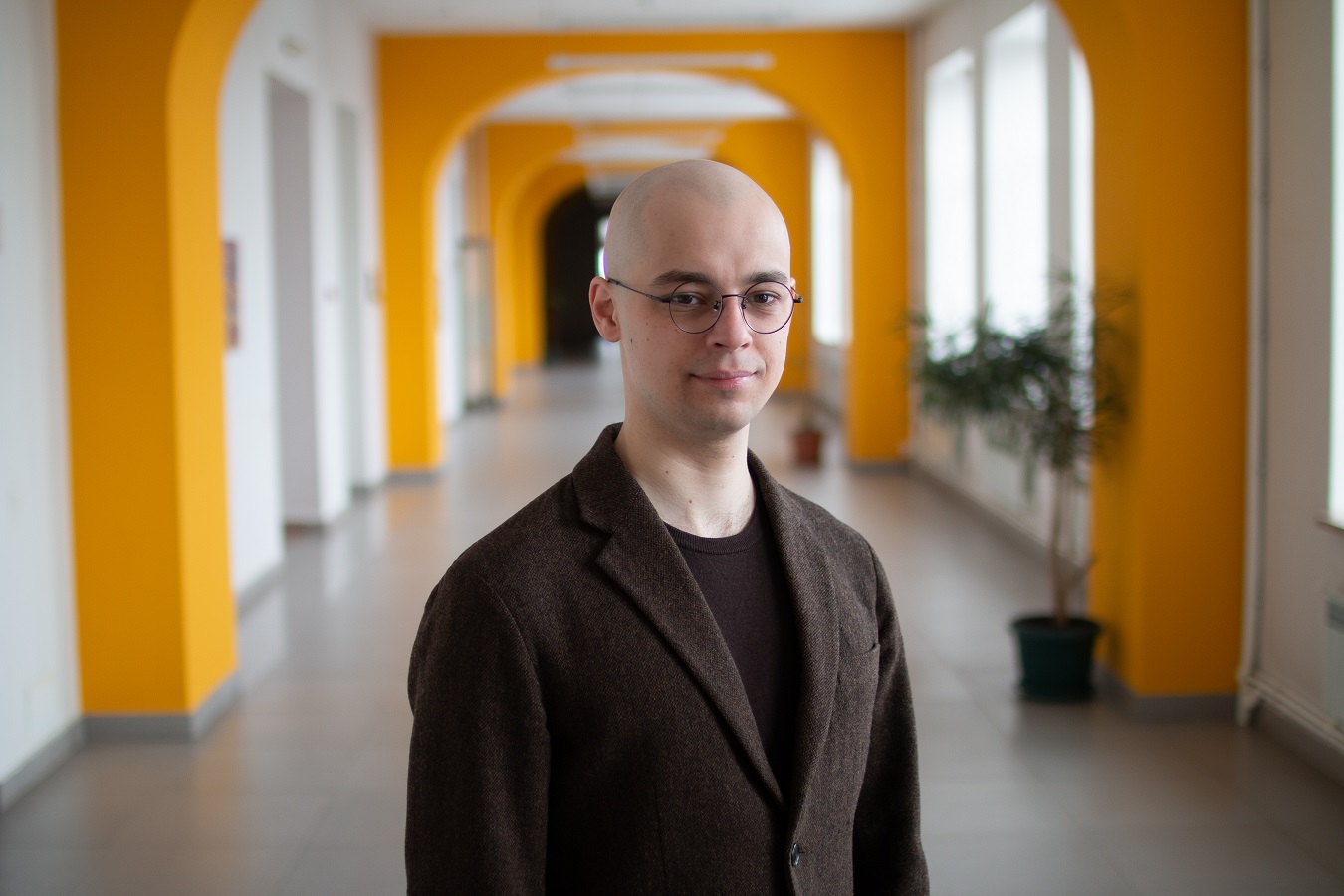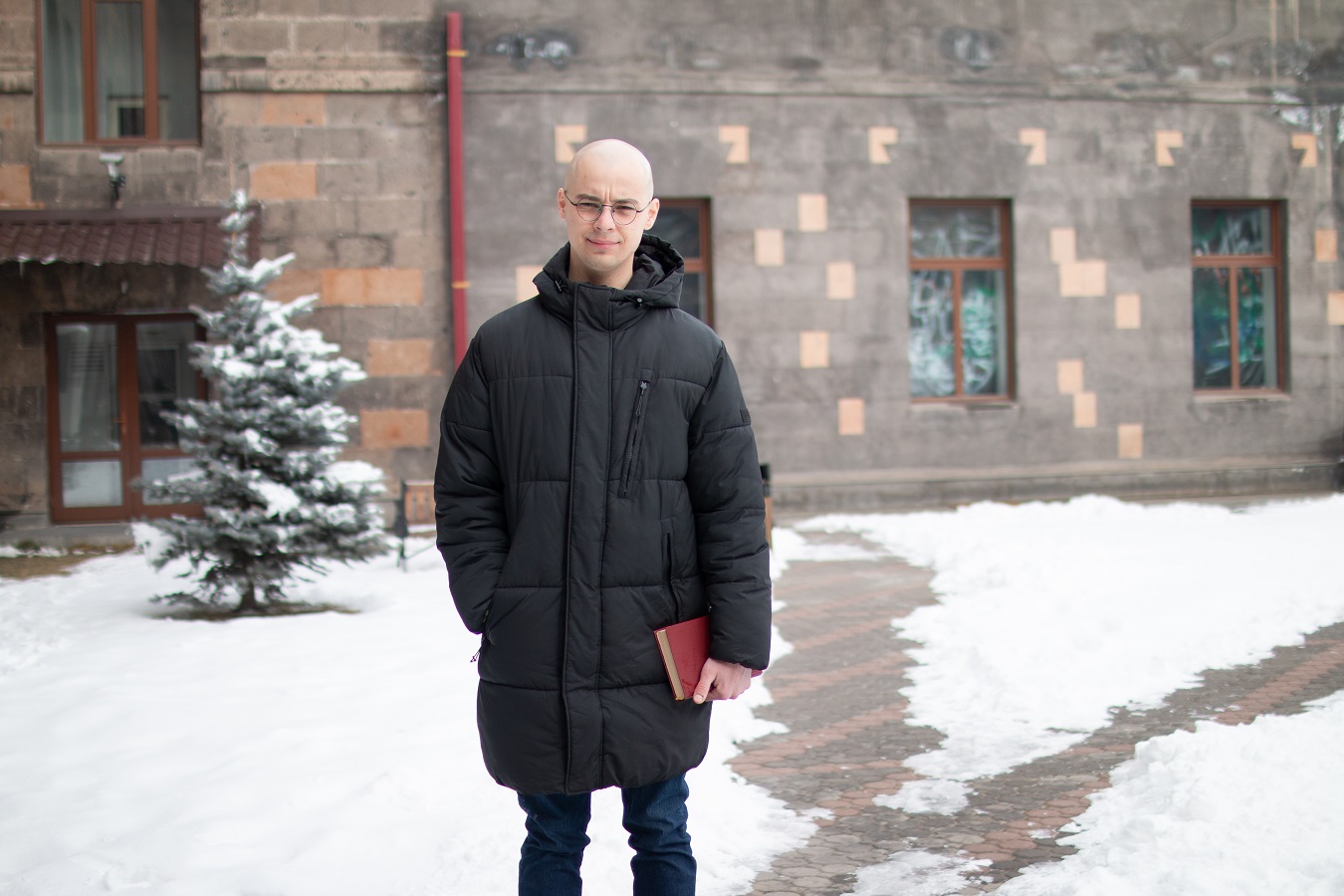‘For me, science means going beyond the usual understanding of things’
Viktor Karpychev
Earned his bachelor’s and master’s degrees from the Moscow State University (MSU) Faculty of Physics. Currently earning a PhD in psychophysiology from the HSE University School of Psychology. His dissertation examines the reorganisation of the language networks in people with epilepsy as compared to healthy subjects.
Viktor Karpychev could have become a screenwriter but instead, he devoted himself to studying how the brain works. In this interview with Young Scientists of HSE, Mr. Karpychev explained how he spends his workdays and which Nobel laureate he would like to meet.
Why I decided to study science
This was not an easy decision and I didn’t make it right away—only as a second-year master’s student. I was studying in the Biophysics Department of the MSU Faculty of Physics and, while working on my graduation thesis in neurophysiology, I learned of the existence of neurolinguistics. I was struck by the fact that there could be a connection between fields as different as neurophysiology and linguistics, and I began reading more about it. I ultimately got in touch with Olga Dragoy, the director of the HSE Centre for Language and Brain.
In the beginning, I just wanted to try immersing myself in neurolinguistics. I didn’t have a clear plan to become a researcher, but after a while, I realised that it was really very interesting. And in principle, it was a continuation of what I was already doing—partly biophysics and mathematics with programming, partly new areas in which I was largely unacquainted, but that now, I hope, I have begun to better understand.
My research focus
In healthy people, language processing occurs in a network of regions predominantly located in the left hemisphere of the brain. The most famous are Broca’s area and Wernicke’s area, and these actively interact with each other. But due to brain damage or epileptic seizures, the interaction of this network can be disrupted. Because the brain has some plasticity to compensate for these disturbances, it begins to involve new regions in language processing or build additional connections with either new or traditional language regions, strengthening or weakening connections.
Despite the fact that science has a general understanding of this situation, the details and nuances are still unknown to us. In particular, it is unclear exactly how such compensation proceeds, whether some newly formed connection is caused by compensation or is simply a consequence of epilepsy, how these processes correlate with the duration of epilepsy and the age of onset of the disease, and so on. I am now dealing with these and many other questions. My topic is the plasticity and reorganisation of the language network in people with epilepsy compared to healthy subjects.
The technical side of the work is like this: we scan a person with epilepsy on an MRI scanner in a hospital, and during the scan, he performs a certain language task. We then analyse his scanned brain and look at how his language network is activated and how the regions are connected to each other in response to the fact that he was performing a task.
So far, we understand that the global integration of the entire language network is reduced in epileptics and that there is far less segregation of individual modules within this language network than in healthy people. To summarise, in epileptics, during the performance of a language task, the specialisation of regions is reduced—that is, all regions try to do everything at once.

My achievements and the results of my research
My colleagues and I used machine learning to classify high frequency oscillations on stereo EEG recorded from people with epilepsy, dividing them into healthy and epileptic. By themselves, these oscillations are biomarkers of the epileptogenic zone, so it is very important for us to be able to find them and understand what type they are. This is more of a clinical part that is related to epilepsy and does not involve language or cognitive tasks.
Also, my colleagues and I were able to study the organisation of the language network in healthy people, and we showed that the corpus callosum is actively involved in the distribution of activity between the regions of the right and left hemispheres. In particular, the greater the volume of the corpus callosum that connects the temporal regions, the stronger the activation in the left hemisphere and the less activation in the right hemisphere. Thus, a larger volume of the corpus callosum leads to a higher specialisation of the regions of the left hemisphere. In the future, it will be interesting to test this result in people with epilepsy.
Why I study epilepsy specifically
I am interested in looking at how the brain adapts over time in people with epilepsy. A huge number of people around the world suffer from epilepsy, including from an early age. Their brains are forced to adapt to the seizures and to the fact that they need to somehow compensate for these disruptions so that the person can continue to speak and understand speech.
My hopes and desires
I would really like to expand scientific knowledge in the field in which I am currently engaged, to change our understanding of how language networks are reorganized in people with epilepsy.
I will give a fairly simple but specific example. It is generally held that networks at rest are very similar to those same networks during the performance of language tasks, as seen by the results of MRI scans. Indeed, many previous studies confirm this. Consequently, many researchers rely on this fact when studying the reorganization of the language network in people with epilepsy. However, there are already indications that this is not the right approach, given the ability of the language network to change considerably during the performance of tasks. Thus, in time, I would like to show that the characteristics of the language networks in healthy people and people with epilepsy differ more from each other during the performance of language tasks than at rest, and that these characteristics could be connected to how accurately the participants carry out the task.
For me, science means going beyond the usual understanding of things.
It is also an enormous labour, the incredible efforts of a large number of people and a patient attitude towards the work.
Science is very attractive when viewed from the outside. Many people would like to achieve something, but after a while, when faced with difficulties—often financial—some begin to lose interest in research and burn out.
It seems to me that if you constantly reflect on why you are doing this and if you realise that you are doing something important, necessary and interesting, this can get you through difficult times and help you move on.
If I had not become a researcher, I would have become a data engineer or a data scientist. There was a time in my life when I thought that I could go work in industry instead of science. And at some point I really wanted to become a screenwriter; I even completed special courses. But by then I had already become very interested in neurolinguistics, and this turned out to be more attractive to me.
The scientist I would most like to meet
Alex Fornito, who was one of the first to apply mathematical graph theory to the study of the interaction of brain regions. I would like to ask him questions about data analysis and interpretation.
Also Gesa Hartwigsen. She studies the reorganisation and plasticity of the language network in stroke victims. Her team has made great progress and published many articles on this subject in good journals. I would like to ask her some conceptual questions about the plasticity of the language network in stroke victims and about the possible differences in compensation for impairments in stroke victims and people with epilepsy.
And Svante Paabo who received the 2022 Nobel Prize in Physiology for deciphering the genome of extinct hominims. In particular, he studied the Denisovans. I would ask him about the evolution of ancient peoples and about their lives in general.
A typical day for me
I try to get up early; I’m more effective in the morning than in the evening. At the same time, I set aside the morning for routine tasks such as writing some text, doing analysis and sending letters. Inspiration doesn’t come until afternoon, and sometimes even closer to the night. If you start in the morning doing everything systematically, by evening you begin to relax and become more spontaneous. You are more open to free thinking and new ideas.
For example, I once read an article about the network of regions of the brain that described the modular organization of the network, and when I was walking back home late at night, I just thought that in my analysis it would be very useful to apply this, since it would give me new results and lead to new conclusions. I tried to implement it the next morning.

Do I burn out sometimes?
Of course. For me, it is primarily associated with physical fatigue and usually manifests itself at the end of the year or the end of a period of vigorous activity. At such times, I try to look at my work and myself from the outside. Of course, meeting with friends and playing sports also helps.
It is also very useful to look at other areas of knowledge. You start to get to know another field and this gives you added motivation to continue doing something in your field because you understand what great discoveries have been made in physiology, medicine or physics.
I recently read Vyacheslav Dubynin’s book The Brain and Its Needs—From Nutrition to Recognition. The subject matter isn’t related directly to my topic, but it was interesting to study. Such reading in the evening can be very useful in avoiding burnout.
My interests outside of science
My great hobby is cinema. I really like watching and analysing films and studying new directors and their individual styles, so I try to go to film screenings and cinema clubs as often as possible.
My favorite director is Paul Thomas Anderson, who directed Licorice Pizza last year, one of my favorite films to date. Among recent films, I liked Drive My Car based on a story by Haruki Murakami from his series Men Without Women.
I also enjoy table tennis. I try playing and I watch the championships and the breakdowns of the games.

Advice for those who are just starting a career in science
First, I would advise you to approach the choice of a research advisor very seriously, since this is the most important person in the life of any young scientist. In addition to professional qualities, I think that it is necessary to have a good match to some extent in terms of temperament and outlook. I know several examples of talented and smart individuals who, unfortunately, ended their careers precisely because of a misunderstanding with their advisor.
My inner circle
The person closest to me is connected with medicine and my parents are doctors. It is worth mentioning that my parents never tried to persuade me to pursue medicine; I had the opportunity to choose my own path. Still, their general influence manifested itself in my life. Now I am very interested in the fundamental, scientific aspect of medicine, and it seems to me that this is manifested in my work.
Many of my friends are programmers, and I have the opportunity to compare the work and life of a scientist versus a person outside of science. Even though working in industry doesn't always give you a deep understanding of what you’re doing, it is certainly a very rewarding and interesting area. To each his own, I think.
Of course, because of the field I work in, some of my friends are also involved in science, which provides a great opportunity to discuss science outside the workplace. One of my best friends and I even thought about trying to record a podcast about neurolinguistics. Maybe we’ll do this someday :)